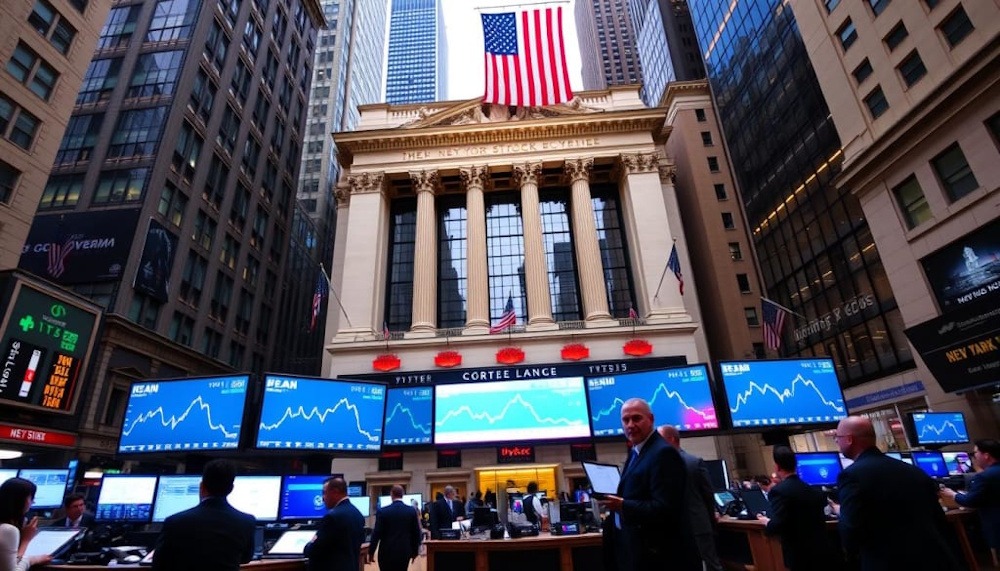
Dow Futures indicate an upward trajectory, as the House of Representatives is poised to vote on legislation aimed at reopening the federal government after an extended shutdown lasting over 40 days. Republicans in control of the House express confidence that the funding measure will gain approval in the lower chamber of Congress, following its clearance by the U.S. Senate earlier this week. Should the shutdown conclude, a substantial influx of deferred economic data will confront Federal Reserve policymakers, who are said to be at odds regarding the future trajectory of interest rates. In other developments, networking equipment company Cisco Systems is set to announce its results amid growing apprehensions regarding substantial investments in artificial intelligence.
Dow Futures edged upward on Wednesday, as legislators in Washington prepared to cast their votes on an agreement aimed at concluding the unprecedented federal government shutdown. By 02:39, the Dow futures contract had risen by 78 points, or 0.2%, S&P 500 futures had climbed by 25 points, or 0.4%, and Nasdaq 100 futures had gained 170 points, or 0.7%. The primary indices concluded the day with mixed results on Tuesday, as a revised revenue forecast from cloud services provider CoreWeave negatively impacted sentiment regarding the AI sector, while the latest weekly jobless claims figures from payroll services company ADP indicated a decline in labor market momentum. Nevertheless, resilience was observed in other segments of the market, as analysts at Vital Knowledge indicated that market participants appeared to be attempting to “stay invested” in anticipation of a possible year-end rally.
Members of the U.S. House of Representatives are set to cast their votes on a compromise aimed at concluding an unprecedentedly lengthy government shutdown. Expectations regarding the imminent reopening of the government were strengthened earlier this week, following the U.S. Senate’s approval of a bill aimed at securing federal funding for the majority of agencies until January 30. Significantly, eight Senate Democrats supported the measure, overcoming a stalemate between their party and President Donald Trump’s Republicans in the upper chamber of the U.S. Congress. If the GOP-controlled House votes in favor of the legislation as anticipated, it is expected that Trump will sign it into law. The reopening of the government would signify the reinstatement of various official economic indicators for financial markets, notably the monthly jobs report, which has experienced delays due to the shutdown. These data points hold significant importance as they enable both investors and policymakers to evaluate the condition of the U.S. economy.
The data blackout has obscured the trajectory for Federal Reserve interest rates, rendering the results of the central bank’s concluding monetary policy meeting in December significantly unclear. Reports says that Federal Reserve members are still split on the decision to reduce rates at the upcoming meeting, following a 25 basis point reduction in borrowing costs during the previous two meetings in October and September. The focus is on the path of employment growth and inflation, which are the dual objectives of the Federal Reserve. On one hand, certain policymakers contend that swift reductions are essential to invigorate hiring and investment in a softening labor market, while others have raised concerns that further cuts might provoke a resurgence in price increases. The absence of new economic data has made it challenging for Fed officials to reconcile their differences, according to the WSJ.
On the earnings calendar, markets will be closely monitoring the results from networking gear provider Cisco Systems following the closing bell on makret. Cisco has encountered a robust environment in recent months, supported by the heightened excitement surrounding AI, which has propelled significant investments in hyperscale cloud and stimulated financing for IT infrastructure. In August, CEO Chuck Robbins indicated that AI infrastructure orders exceeded $800 million in Cisco’s fiscal fourth quarter, elevating the total for the full-year period to over $2 billion. Robbins noted that the “sovereign AI opportunity” is expected to gain traction in the latter half of fiscal 2026, reinforcing Cisco’s role as a “core system provider for these substantial AI training and inference cluster build outs […] essential to their development and eventual hyperscaling.” The company is projected to report fiscal first-quarter adjusted earnings per share of $0.98, accompanied by revenue of $14.77 billion, as per Bloomberg consensus estimates.
A strategy update on Wednesday at U.S. oil major Chevron will likely highlight CEO Mike Wirth’s plan to initiate a new phase of growth following a substantial $55 billion acquisition of smaller peer Hess. The forthcoming event will convene executives and prominent shareholders in New York City, following the company’s completion of the Hess merger in July. The Hess transaction stands as one of the most significant in the oil sector in recent years, serving as a focal point in Wirth’s efforts to enhance Chevron’s returns. The sale is significant as it encompasses Hess’ 30% interest in a consortium with Exxon and China’s CNOOC, which has identified more than 11 billion barrels of oil in the Stabroek offshore block in Guyana. Analysts have indicated that the discovery holds potential recoverable oil of approximately 20 billion barrels, positioning it as a crucial strategic asset for Wirth, who may encounter inquiries regarding Chevron’s exploration strategies following a significant decline in oil and gas reserves in 2024. “Chevron’s acquisition of Hess is viewed by analysts at Wolfe Research as having been executed at a full price,” the note stated. They noted that longer-term inquiries have also emerged regarding the future of Chevron’s operations in Kazakhstan, which are projected to represent approximately 18% of free cash flow in the upcoming year and 20% from 2026 to 2030. “Tackling this matter alongside a relatively developed shale portfolio in acquired assets will be pivotal topics at the forthcoming Investor Day.”
